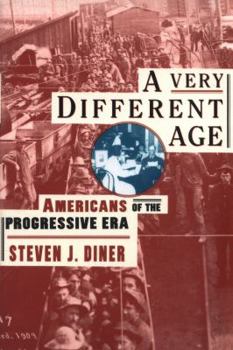A Very Different Age: Americans of the Progressive Era
Select Format
Select Condition 
Book Overview
The early twentieth century was a time of technological revolution in the United States. New inventions and corporations were transforming the economic landscape, bringing a stunning array of consumer goods, millions of additional jobs, and ever more wealth. Steven J. Diner draws on the rich scholarship of recent social history to show how these changes affected Americans of all backgrounds and walks of life, and in doing so offers a striking new interpretation of a crucial epoch in our history.
Format:Paperback
Language:English
ISBN:0809016117
ISBN13:9780809016112
Release Date:August 1998
Publisher:Farrar, Strauss & Giroux-3pl
Length:336 Pages
Weight:0.75 lbs.
Dimensions:0.9" x 5.0" x 8.7"
Customer Reviews
3 ratings
Not Just For Historians
Published by Thriftbooks.com User , 17 years ago
Steven Diner's A Very Different Age is a social history of the common man during the "Progressive" years in American history (circa 1890's through 1910's). Rather than focus on specific events or people, the book investigates society as a whole. In effect Diner is saying that while individuals make the history books, the group is what makes history happen. Diner organizes the book in a mostly chronological manner. He starts with the crises of the 1890's in his prologue and ends his final chapter dealing with World War One in the late 1910's. Every time period in between deals with a different set of people, but follows in a roughly chronological fashion. If Diner is arguing that the people are the protagonists of history, then what they are acting for seems to be a better station in life. Business owners struggle against managers at the turn of the century in order to establish a more efficient factory, while managers strike back in order to preserve their well-being and way of life. Workers square off against their managers and business owners in order to establish safer working conditions and fair pay, while the owners attempt to suppress such uprisings to keep their profit margins high. Immigrants strive to raise their status by scooping up whatever work they can find (mostly low paying factory jobs) so that they can achieve a better life either in America or in their home country, while native-born Americans and previous generations of immigrants ostracize them as being a different and therefore inferior race. Meanwhile American farmers become sucked into the capitalist system, unable to remain autonomous sustenance farmers any more they must submit to the whim of the supply and demand forces of capitalism at the same time subjecting themselves to the invisible man who established their commodities' prices. African Americans struggle for freedoms given to seemingly everyone else, the white collar middle class emerges as a powerhouse in the American economy, professionalization occurs in such fields as medicine and law requiring doctors and lawyers to be adequately educated and organized, politicians begin catering to the public's demands for a more active government, and eventually the era comes to a close soon after the first World War. Diner presents compelling cases for everyone's contributions during the progressive era. The book reads more like a narrative than a presentation of facts and events. It is this narrative that makes Diner's argument so strong because it makes the book feel more human. People tell stories in a different way than a textbook does. If Diner is arguing that the masses are the most important part of this period, then the style of the book allows for the reader to assume the "people" are speaking directly to them. The social history angle also provides a refreshing change of pace from "normal" history books. While stories of strong individuals or decisive events throughout history can be inspir
Fine Overview
Published by Thriftbooks.com User , 25 years ago
This is a relatively short but cohesive social history of the progressive era. Diner's primary aim is to decipt of the attempts of many sectors of American to adapt the demands of industrial capitalism. This book is written well and a nice complement to other histories oriented towards politics and legislation. Diner also does well to review the efforts of groups not typically covered in conventional histories of the period, such as managers and professionals. An insightful and useful book.
A good starting point
Published by Thriftbooks.com User , 25 years ago
This book offers personal stories of those involved in the changing times of the Progressive Era. Diner drives home the point of the competition between Americans at this time. The competition for jobs, leisure time, consumer goods, etc. Someone who already is familiar with the Progressive Era would be bored, but for those just starting it is a good book.






